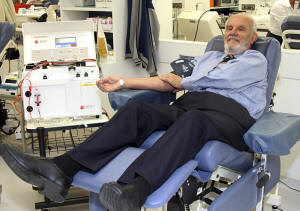James Harrison, whose blood plasma donations are credited with saving
2.4 million babies, dies at 88
[March 04, 2025]
By ROD McGUIRK
MELBOURNE, Australia (AP) — An Australian man credited with saving 2.4
million babies through his record-breaking blood plasma donations over
six decades, has died at 88, his family said Tuesday.
James Harrison, a retired state railway department clerk, died in a
nursing home on the central coast of New South Wales state on Feb. 17,
according to his grandson, Jarrod Mellowship.
Harrison had been surprised to be recognized by Guinness World Records
in 2005 as the person who had donated the most blood plasma in the
world, Mellowship said.
Despite an aversion to needles, he made 1,173 donations after he turned
18 in 1954 until he was forced to retire in 2018 at age 81.
“He did it for the right reasons. As humble as he was, he did like the
attention. But he would never do it for the attention,” Mellowship said.
The record was beaten in 2022 by American Brett Cooper from Walker,
Michigan.
Australian Red Cross Blood Service pays tribute to donor
The Australian Red Cross Blood Service said Harrison was renowned as the
“Man with the Golden Arm.”
He was credited with saving the lives of 2.4 million babies through his
plasma donations, the national agency responsible for collecting and
distributing blood products, also known as Lifeblood, said in a
statement.

Harrison’s plasma contained a rare antibody known as anti-D. The
antibody is used to make injections that protect unborn babies from
hemolytic disease of the newborn, in which a pregnant woman’s immune
system attacks her fetus’ red blood cells. The disease is most common
when a woman has an Rh negative blood type and her baby's is Rh
positive.
Australia has only 200 anti-D donors who help 45,000 mothers and their
babies annually.
[to top of second column]
|

In this May, 2011, photo provided by Australian Red Cross Lifeblood
donor James Harrison, credited with saving 2.4 million babies
through his record-breaking blood plasma donations over decades, is
giving blood at donation center in Sydney. (Australian Red Cross
Lifeblood via AP)
 Lifeblood chief executive Stephen
Cornelissen said Harrison had hoped that someone in Australia would
one day beat his donation record.
“James was a remarkable, stoically kind and generous person who was
committed to a lifetime of giving and he captured the hearts of many
people around the world,” Cornelissen said in a statement.
“It was James’ belief that his donations were no more important than
any other donors' and that everyone can be special in the same way
that he was,” Cornelissen added.
Antibody helps donor's family
Mellowship said his mother, Tracey Mellowship, Harrison’s daughter,
needed the treatment when he and his brother Scott were born.
Jarrod Mellowship said his own wife, Rebecca Mellowship, also needed
the treatment when three of their four children were born.
There is speculation that Harrison developed a high concentrations
of anti-D as a result of his own blood transfusions during major
lung surgery when he was 14 years old.
“After the surgery, his dad Reg told grandad you’re only really
alive because people donated blood,” Jarrod Mellowship said. “The
day he turned 18, he started donating.”
The application of anti-D in fighting hemolytic disease of the
newborn was not discovered until the 1960s.
Harrison was born in Junee in New South Wales. He is survived by his
sister Margaret Thrift, his daughter, two grandsons and four great
grandchildren.
All contents © copyright 2025 Associated Press. All rights reserved |